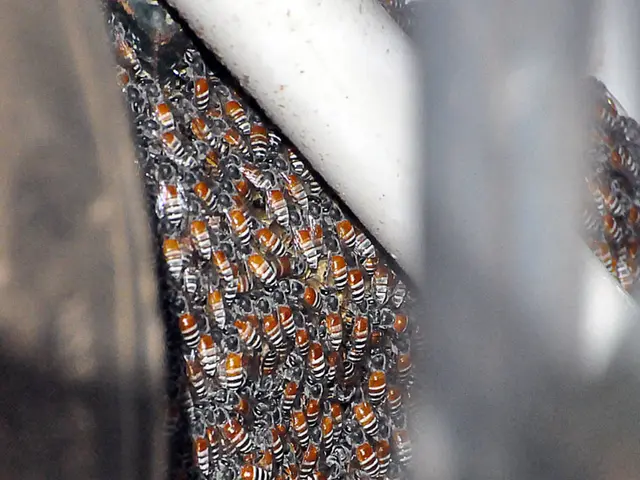Uncensored: The Case of CDU and The Left Since the Chancellor Election
CDU's Incompatibility Verdict Announced on Tuesday
Social Media Newsletter Text Message Email Print Permalink
The Union faction is set to chat with The Left today, hoping for a second round of voting for the Chancellor election in the Bundestag. The CDU's historic "Incompatibility Resolution" appears to be a thing of the past, according to The Left's leader, Schwerdtner. She labels Chancellor Merz as "class enemy."
Schwerdtner, the leader of The Left, views the Union's distancing from her party post-Chancellor election as a relic of the past. "We extended our congrats to Friedrich Merz on Tuesday and made it clear he'll still need us," she said to ntv.de. Despite the absence of direct dialogue with Merz, who was elected Chancellor in the second round on Tuesday, "in essence, the CDU's 'Incompatibility Resolution' is history since Tuesday."
Political fallout and shock
"This resolution is rather outdated anyway and has long been surpassed at the state level," Schwerdtner continued. "But I understand that there's an ideological barrier for Merz. He's already broken two central campaign promises with the debt brake and the special fund before his election as Federal Chancellor, and now he's expected to negotiate with The Left. That's a big ask for the CDU. However, reality will eventually catch up with Merz. The new coalition has already penned in the coalition agreement that it aims to reform the debt brake."
Schwerdtner remains open for further negotiations with the Union. "No one in our party wants to negotiate with Friedrich Merz," she stated. "But we converse with all democratic parties if necessary, such as to achieve a reform of the debt brake."
The class enemy or just a Wall Street insider?
Schwerdtner won't rest until the debt brake is reformed because municipalities and states urgently need cash. "If we can assist the municipalities, then I'll even sit down with the class enemy," she said. When asked if Merz was "the class enemy," she responded: "Yeah, in a sense. I mean, the man was at BlackRock. It's hard to imagine someone like that becoming Chancellor."
In the morning, the new Chancellery chief, Thorsten Frei, showed openness to abolishing the "Incompatibility Resolution" in the ntv morning show. "We'll discuss this together," said the CDU politician. During the Chancellor election in the Bundestag, the problem of not being able to organize a two-thirds majority in advance arose once more. Although the CDU's federal party congress resolution cannot be abolished with a simple stroke of the pen, "but we find ourselves in a situation where we must reconsider one or two questions."
Background on the CDU-The Left relationship
The Christian Democratic Union (CDU) has traditionally maintained a hardline policy—known as the "Incompatibility Resolution"—toward The Left party (Die Linke). This resolution stems from CDU concerns about The Left's ideological differences and political heritage, principally due to The Left's lineage tracing back to the Socialist Unity Party of Germany (SED), the former East German communist party.
The incompatibility resolution is rooted in Cold War-era anxieties about the legitimacy of the East German regime and the need to maintain distance from undemocratic practices. Additionally, The Left's leftist, sometimes radical, economic and social policies conflict with the CDU's centrist, Christian-democratic, and market-oriented platform.
Coalition possibilities between the CDU and The Left at the national level in the Bundestag or federal government are nonexistent. The CDU's stance may soften in the future, especially when traditional coalition dynamics are challenged by emerging political parties like the Sahra Wagenknecht Alliance. However, no formal adjustments have been made to the CDU's policy.
Probability of future negotiations
Currently, the CDU's "Incompatibility Resolution" with The Left remains intact, making future negotiations and coalitions between the two parties highly unlikely in the near future. A major shift in The Left's platform or a significant transformation in the German political landscape would be required for any negotiations to materialize.
People/Parties Mentioned- The Left (Die Linke)- Friedrich Merz- CDU- Thorsten Frei- Sahra Wagenknecht Alliance- Socialist Unity Party of Germany (SED)- AfD (Alternative for Germany)
- The Commission, in light of the requests, will submit a proposal for a directive on the protection of workers from the risks arising from the use of electronic equipment, as the Chancellor election and the subsequent political landscape have brought the issue of the CDU's incompatibility with The Left into question.
- Despite Schwerdtner's labeling of Chancellor Merz as a "class enemy," there is a possibility for negotiations between The Left and the CDU, as Merz has supposedly shown openness to abolishing the "Incompatibility Resolution."
- The CDU's historical policy on The Left, rooted in Cold War-era anxieties and ideological differences, seems to be undergoing changes, with the CDU's new Chancellery chief, Thorsten Frei, expressing readiness to reconsider the resolution.
- The policy-and-legislation implications of this potential shift in the CDU's stance toward The Left could reshape the general news landscape, given the long-standing incompatibility between the two parties and the centrist, market-oriented platform of the CDU.








